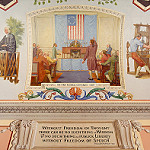A few weeks ago I took part in a conference at Lindenwood University devoted to “Free Markets and Localism.” Most of the other faculty participating in the event were far more sympathetic to libertarianism than are most Catholic theologians, including me. Conversation was sometimes challenging, but I am learning things from this dialogue that I don’t learn in my usual circles.
1. Many people are deeply resentful about paying taxes. I don’t mean annoyed or less-than- thrilled. They see taxes as “forced charity.” In the words of a recent article by economist Stacie Beck in America magazine,
“Is it right to compel productive people to be charitable? Or is it our duty to persuade them to be so of their own accord? Is it social justice to advocate for more redistribution as a public policy? Or is it social justice to bring productive people together with those in need within church communities to inspire the generosity, help and compassion Christ asked for?”
Paying taxes is not my favorite thing to do, but I try to think about it as my contribution to the common good. Really. But as a Catholic moral theologian, I have to ask myself how can I respond to the much more common aversion to redistribution.
2. Lots of different kinds of people are excited about “localism.” I never expected to be chatting with libertarians about the patronizing local hardware stores, participating in local government, and buying from local farmers. In fact, I was invited to this conference because of my work emphasizing the “local” part of Catholic Social Teaching. Of course, the principle of subsidiarity means decisions should be made “at the lowest level possible and the highest level necessary,” according to Meghan Clark’s helpful post on our blog, and my libertarian conversation partners aren’t quite as sure as I am that “the highest level” is needed pretty frequently. Still, we share a sense that generally, life is more humane when we keep things local, like shopping at a Farmer’s Market, or being a part of a small parish or a small class. My (anarchist) Catholic Worker friends might actually have more in common with the libertarians than they might think!
3. Empowerment of poor people concerns both those on the far right and those on the far left. Economist Beck asks, “What incentives exist in tax and transfer systems to help the poor live a moral and productive life?” and “Are those living in poverty better off with an unequal slice of a bigger economic pie or an equal slice of a smaller economic pie?” A libertarian economist at my conference also raised questions about the effectiveness of transfer programs in lifting the poor out of poverty into independent living. He claimed we must accept inequality because it is correlated with overall economic progress. These economists differ profoundly from the radical community organizers I met when I traveled to Nicaragua with students in 2008, but interestingly enough, my radical friends raised hard questions about rich Christians coming to play Santa Claus in Latin America without empowering people to live decent lives on their own. They discouraged us from giving to those who begged, refused to allow donors to partner with a community unless they first spent lots of time listening to the hopes and dreams of the people they wanted to help. Both groups are interested in empowerment. As a moral theologian who is deeply concerned about the poor, I have to ask myself, am I asking not just who deserves what (an important question, to be sure) but what truly empowers?
Of course, we have to be aware that many of those living in poverty are not going to be self-sufficient due to age, diability, caregiving responsibilities, etc. Still, the reality is complicated, as, for instance, Chana Joffey-Walt’s recent series, “Unfit for Work: The Startling Rise of Disability in America” attests. It’s not always clear that anti-poverty programs are as focused on poverty reduction as our friends on the far right and far left would like them to be.
4. Libertarians can be passionate about human dignity. In a response to Beck’s article, Meghan Clark asserts, “the very heart of Catholicism’s theological anthropology is revealed. People have value, not because they are useful to society, but because they are created in the image and likeness of God.” She worries that those like Beck, who question the entitlement talk of social justice advocates, miss this essential point. Yet the libertarians I spoke with echoed Beck’s claim that “it is best to encourage and assist people to become more productive whenever possible. In addition to more prosperity, this creates a sense of satisfaction and self-worth and is almost surely most consistent with God’s plan.” Like Clark, I worry when I hear great concern about entitlement coupled with limited acknowledgement of social structures that keep some people down and prop other people up. But what if, instead of pointing to that (admittedly large) area of disagreement, I tried to point to the overlap on human dignity?
5. I am not nearly as open-minded as I think I am. Engaging in meaningful conversation with those on “the other side” is tough. Boston College theologian Richard Gaillardetz recently came to my university to talk about “Holy Conversation.” He talked about all of the forces contributing to polarization and suggested we look to the Catholic tradition for insight about how to engage in a different kind of conversation. What stood out to me was his claim that to engage in conversation outside my comfort zone involves opening myself to being converted, if not to the position of my opponent, at least to seeing her position in a different light. As an example, he cited the Common Ground Initiative of late Cardinal Bernadin, in which eating and praying together with “the other side” (and finding out that hey, they have kids, too!) laid the groundwork for tough dialogue.
Because I am not even close to libertarian, I found myself frustrated at many points in the “Free Markets and Localism” conference. (Did I mention it was funded by the Koch brothers?) I made comments that (I’m sure) made others ask, “Who invited her?” By the end of the day, I was spent. This kind of conversation is work, holy work, as Gaillardetz says. Some days I’m not sure that I’m up to it.
Last week I received a thank-you note from the organizer of the conference, thanking me for my contribution, and suggesting we have coffee sometime this summer. She signed the note “In Christ.” So I’ll be having coffee (at a local, independent place) and trying to figure out what a social justice Catholic and a libertarian Anglican have in common. I’m absolutely sure that I’ll learn new things.





Hi Julie– This is great work – even if grueling. These are important conversations to have. At our food co-op, I am acutely aware of the potential confluences of localist liberals and libertarian Ron Paul types (and the differences, too!).
Your point about the view of taxation is particularly important, I think. In my research, I have become aware that compared to many other developed economies, the US asks roughly middle and upper-middle income taxpayers to shoulder a disproportionate burden. With our unusual low tax rates on the wealthy and on investment income, and with the low-wage tax subsidies and other breaks for those earning poor wages, the result (besides ballooning deficits) is that de facto taxes on the American earning 50-125K seem frustratingly high. Other economies are also helped by the existence of the invisible VAT tax on consumption – unlike our sales tax, folded into the price – so that actual income taxes can be lower. Even if Ms. Beck’s caricature of taxation is deeply problematic, we do face the problem that we’ve dug ourselves into a situation where income taxes on middling earners are perceived to be unfair…. which creates a natural constituency for anti-tax political forces, despite the fact that their proposals (e.g. the flat tax, capital gains breaks, the estate tax) are really proposals for the huge tax cuts for the super-wealthy.
Beyond this, I think we need to raise awareness of what taxes actually pay for and what a “bargain” some of this is, even at current rates. The tool available at Third Way: http://www.thirdway.org/taxreceipt allows you to put in your tax bill and it is broken down into quite detailed categories. I think it is very interesting and enlightening!
Why weren’t Catholics (esp. Catholic blogs) having these conversations during the past election?!?! I had basically given up on some Catholic discussions because they devolved into simplistic caricatures of cable TV. For example, and this dovetails with your discovery of libertarians’ appreciation for localism – I found it frustrating beyond all get out when the criticisms of many conservatives over Dodd-Frank’s impacts on smaller, community banks, and how it has not really ended “too big to fail” were simply spouting Randian-esque anti-regulation talking points! Better late than never I guess.